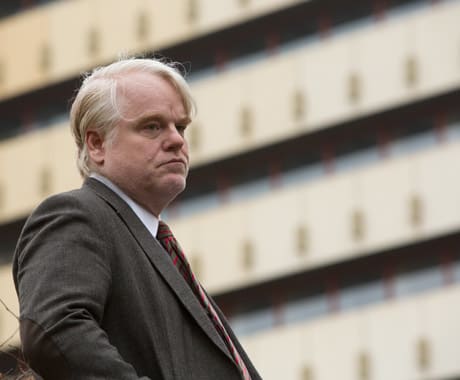As far as final movie roles go, Philip Seymour Hoffman's last completed portrayal of a character in Anton Corbijn's A Most Wanted Man leaves a lasting impression thanks to his understated delivery. However, it's that same clear-cut subtlety — one that pervades every piece of scenery in this morose espionage thriller, based on the novel of the same name by John le Carré — that will leave some viewers grasping for more from this posthumous picture.
Hoffman plays Günther Bachmann, a harried leader of a modern-day anti-terrorism unit stationed in Hamburg, Germany. Set sometime after 9/11 (which were first planned for in the port town by Mohamed Atta), Bachmann and his team get word that a young half-Chechen, half-Russian immigrant, Issa Karpov (played here by Grigoriy Dobrygin), has taken refuge in the country after suffering torture and imprisonment in his homeland.
Looking to claim his deceased father's fortune, Karpov meets up with a young human rights lawyer (Rachel McAdams), whose rosy view of the world contradicts those who believe Karpov's sudden appearance hints at a much more sinister scenario. Hunted by an American CIA operative (the always excellent Robin Wright) and the head of Hamburg's intelligence agency (Rainer Bock), Hoffman and his team (which includes a remarkably underused Daniel Brühl, who barely utters a syllable throughout) must race to uncover whether or not Karpov is the evil mastermind the higher ups imagine him to be.
Filled with starkly beautiful cinematography, Corbijn — who has recently worked his stylistic wizardry on such features as the Joy Division biopic Control and George Clooney's art-y thriller The American — does a masterful job depicting the slow burning process of a post-9/11 governmental organization, which is all the more accented by Hoffman's languid performance of a professional with the weight of the world on his shoulders.
Still, for those unfamiliar with le Carré's work or uninterested in the kind of criminal drama that's more cerebral than action-packed, A Most Wanted Man's Hitchcock-ian portrayal of a pair of political organization's anti-brinkmanship, may feel a tad worn down, especially when the majority of the film involves Hoffman and co. simply following one another around, speaking in hushed tones and meeting amongst even more subdued backdrops.
With nine of le Carré's stories being adapted to the silver screen over the years — including this one, which was originally published in 2008 — it's hard not to feel like A Most Wanted Man could've been made more relevant had it come out closer to Bush's residency when we were still all experiencing a global, post-fear mongering malaise. However, the fact this is Hoffman's final full appearance in a film still makes this a worthwhile watch, if only to remember the joy he brought moviegoers in more unsure times.
(eOne)Hoffman plays Günther Bachmann, a harried leader of a modern-day anti-terrorism unit stationed in Hamburg, Germany. Set sometime after 9/11 (which were first planned for in the port town by Mohamed Atta), Bachmann and his team get word that a young half-Chechen, half-Russian immigrant, Issa Karpov (played here by Grigoriy Dobrygin), has taken refuge in the country after suffering torture and imprisonment in his homeland.
Looking to claim his deceased father's fortune, Karpov meets up with a young human rights lawyer (Rachel McAdams), whose rosy view of the world contradicts those who believe Karpov's sudden appearance hints at a much more sinister scenario. Hunted by an American CIA operative (the always excellent Robin Wright) and the head of Hamburg's intelligence agency (Rainer Bock), Hoffman and his team (which includes a remarkably underused Daniel Brühl, who barely utters a syllable throughout) must race to uncover whether or not Karpov is the evil mastermind the higher ups imagine him to be.
Filled with starkly beautiful cinematography, Corbijn — who has recently worked his stylistic wizardry on such features as the Joy Division biopic Control and George Clooney's art-y thriller The American — does a masterful job depicting the slow burning process of a post-9/11 governmental organization, which is all the more accented by Hoffman's languid performance of a professional with the weight of the world on his shoulders.
Still, for those unfamiliar with le Carré's work or uninterested in the kind of criminal drama that's more cerebral than action-packed, A Most Wanted Man's Hitchcock-ian portrayal of a pair of political organization's anti-brinkmanship, may feel a tad worn down, especially when the majority of the film involves Hoffman and co. simply following one another around, speaking in hushed tones and meeting amongst even more subdued backdrops.
With nine of le Carré's stories being adapted to the silver screen over the years — including this one, which was originally published in 2008 — it's hard not to feel like A Most Wanted Man could've been made more relevant had it come out closer to Bush's residency when we were still all experiencing a global, post-fear mongering malaise. However, the fact this is Hoffman's final full appearance in a film still makes this a worthwhile watch, if only to remember the joy he brought moviegoers in more unsure times.
